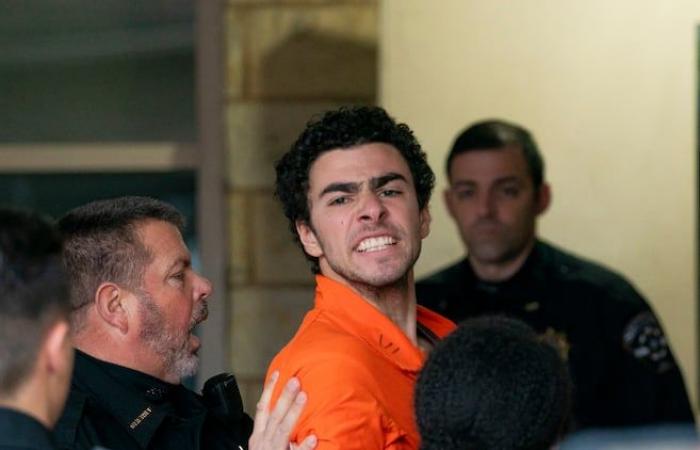Luigi Mangione was previously charged with murder in the Dec. 4 death of Brian Thompson, but the terrorism charge is new.
Under New York law, such a charge can be brought when an alleged crime is “intended to intimidate or coerce a civilian population, to influence the policies of a governmental unit through intimidation or coercion, and to “affect the conduct of a governmental unit by murder, assassination or kidnapping.”
The defendant’s New York lawyer has not commented on the case.
Brian Thompson, 50, was shot to death as he walked to a Manhattan hotel where Minnesota-based UnitedHealthcare, the largest U.S. medical insurer, was holding an investor conference.
“This was a frightening, well-planned and targeted murder intended to shock, attract attention and intimidate,” Manhattan District Attorney Alvin Bragg said Tuesday during a court hearing. press conference. “It occurred in one of the busiest areas of our city, threatening the safety of residents and tourists, workers and business people as they began their day.”
After days of intense police searches and publicity, Mangione was spotted at a McDonald’s in Altoona, Pennsylvania, and arrested. New York police officials said Mangione carried the gun used to kill the CEO, a passport and several fake ID cards, including one that the alleged shooter presented to check into a hostel in New York.
The 26-year-old was charged with firearms and counterfeiting offenses in Pennsylvania and locked up there without bail. His Pennsylvania lawyer questioned the evidence for the forgery charge and the legal basis for the gun-related charge. The lawyer also said Mangione would oppose extradition to New York.
Luigi Mangione is scheduled to appear twice in Pennsylvania courts on Thursday, including once for an extradition hearing, prosecutor Bragg noted.
Motivated by anger against the American healthcare system
Hours after his arrest, the Manhattan district attorney’s office filed documents charging him with murder and other crimes. The indictment is based on these documents.
The theory investigators are working on is that Mangione, a computer science graduate from a well-known school from a prominent Maryland family, was motivated by anger at the U.S. health care system. A law enforcement bulletin obtained by The Associated Press this week indicates that when he was arrested, he was carrying a handwritten letter calling health insurance companies “parasites” and complaining about corporate greed.
Luigi Mangione has repeatedly posted on social media how his spine surgery last year relieved his chronic back pain, encouraging people with similar ailments to speak out if they are told they simply should live with it.
In a post on Reddit in late April, he advised someone with a back problem to seek further advice from surgeons and, if necessary, to say that the pain made it impossible to work.
“We live in a capitalist society,” Mangione wrote. I have found that the medical industry responds to these keywords much more quickly than you do when you describe unbearable pain and its impact on your quality of life.”
He was never a UnitedHealthcare customer, according to the insurer.
The suspect has apparently become cut off from his family and close friends in recent months. His family reported his disappearance to San Francisco authorities in November.
Brian Thompson, who grew up on a farm in a small town in Iowa, trained as an accountant. Married and father of two high school students, he worked for 20 years for the giant UnitedHealth Group and became CEO of its insurance branch in 2021.
His killing sparked a wave of resentment toward America’s health insurance companies, as Americans traded stories, online and elsewhere, about being denied coverage, being left in limbo while that doctors and insurers disagreed and ended up with significant bills.
The shooting also rattled executives, as posters saying “wanted,” with the names and faces of other health care executives, appeared on New York streets and a wave of vitriolic posts online prompted police to warn there could be a “high threat”.
___
Associated Press writer Michael R. Sisak contributed to this report.






